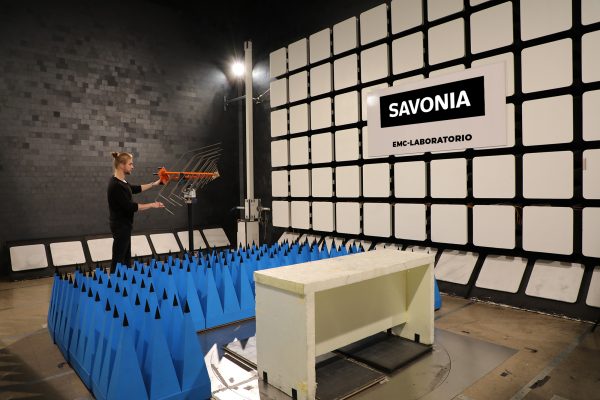R&D actors in spotlight – Savonia EMC laboratory
Savonia University of Applied Sciences is one of Finland’s largest and most versatile universities of applied sciences. In addition to its over 7,000 students, Savonia actively serves the local business life and provides its services for research, product development and testing by companies and communities. Its customers’ needs range from the manufacturing of piloting products and prototypes to product research and testing before market entry. Savonia’s facilities have the latest technology and equipment. Most of the premises located on the Microkatu campus in Kuopio are brand new or have been fully renovated in recent years.
Electromagnetic Compatibility (EMC) testing is an important part of the development and production of electronic products, vehicles and machines. The testing is used to ensure that the products work smoothly without any disturbances or faults caused by electromagnetic fields. EMC testing is critical to demonstrate that a product conforms to requirements and to ensure product safety and performance. Meanwhile, EMC testing at the product development stage helps identify and repair any problems before market entry.
The EMC laboratory is part of Savonia’s product development and testing units in electrical engineering and ICT. The laboratory was established in 2000. The EMC laboratory is a T301 testing laboratory accredited by the FINAS accreditation service that meets the SFS-EN ISO/IEC 17025 standard. The laboratory’s testing setting meets industry requirements and is a great fit for testing small vehicles and machines.
“We have years of experience in EMC testing. Our operations are primarily focused on EMC testing carried out for client companies, who we provide with flexible and customer-driven services. We’re also involved in research projects related to the field in a smaller extent”, says Marko Sorsa, a research engineer and method coordinator at the EMC laboratory.
Other product groups commonly tested at the laboratory include household appliances, vehicle equipment, measuring instruments and medical devices. The testing site for radiated disturbances is a shielded, semi-attenuated room with a so-called three-metre measurement site whose length is 9 m, width is 6 m and height is 5.9 m. The testing site floor’s carrying capacity is 1,500 kg. For conducted disturbance testing purposes, the laboratory has a shielded space. Small-scale hot air oven testing is also available.
The services include both EMC testing and EMC expert services. The EMC testing laboratory’s services are aimed at Finnish and international product manufacturers, product development companies and importers interested in ensuring their products’ compliance with EMC standards. The laboratory’s specialists also serve as an expert organisation to support companies throughout the process, from compliance assessment to approval.
The EMC testing services include Full Compliance, Pre Compliance and R&D testing services. The expert services include compliance assessment for the customer’s products, testing plans and R&D project support services.

Photo: Savonia
- Full Compliance testing is performed before including a CE marking on the product, i.e. before introducing the product to the market. This testing and the report drawn up based on it is used to indicate that the product complies with the EMC requirements set for it.
- Pre Compliance testing is an intermediate step that can be used to demonstrate that the product has reached its interim target during a product development project, for example to a funding provider. The testing is used to demonstrate that the product has also reached the set interim targets from an EMC requirement perspective.
- The R&D testing service involves testing the product during product development to form a preliminary understanding of the product’s level of compliance with the EEMC requirements as well as any parts of the testing where problems occur.
“The EMC laboratory has been developed significantly in the past few years thanks to recently completed development projects and annual investments have helped us stay on this strong development track. During this period, the strongest technical development has been due to the electrification of machinery and vehicles as a part of the green transition, which is reflected as the largest product group in our laboratory’s booking system.”
“Our laboratory has been persistently developing our EMC testing for vehicle equipment and small vehicles for years, and we intend to continue this development in the coming years. Our second main testing branch that we’re developing includes medical devices, industrial equipment and measurement instruments. And as mainly the same EMC methods and required testing equipment are used for any product group, developing one of our branches will always also automatically benefit the others. Testing one customer product primarily always requires around 10–15 EMC testing methods, and the time required for each testing round is around 1–3 weeks”, Sorsa explains.
“The EMC requirements apply to all devices, machines, vehicles and products that involve electricity in any way. Despite this, companies typically have very little EMC competence, and the world of EMC requirements and standards is extremely broad. As a result, small and often also medium-sized enterprises benefit from using the expertise of our EMC laboratory’s specialists in the EMC compliance assessment, planning of EMC testing and supporting their R&D projects. Our services allow you to get straight to the point with relatively low costs and focus on the requirements that apply to your specific product”, Sorsa concludes.
Contact us:
Marko Sorsa, Research Engineer, Method Coordinator, Savonia University of Applied Sciences: marko.sorsa(at)savonia.fi
Savonia is one of Finland’s biggest and most versatile universities of applied sciences. Savonia’s laboratories are suitable for research, product development and testing by companies and communities. Its customers’ needs range from the manufacturing of piloting products and prototypes, product research and testing before launching products to the market.